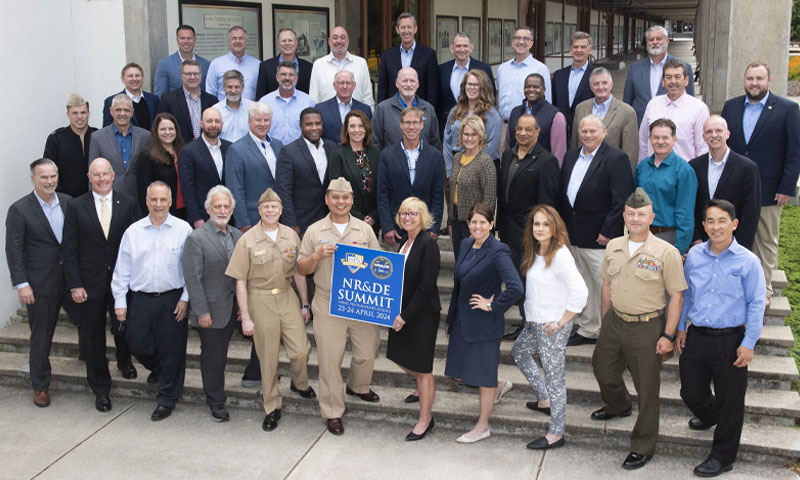Senior leaders from the Naval Research and Development Establishment (NR&DE) gathered at the Naval Postgraduate School (NPS) to discuss strategic priorities, STEM workforce needs and accelerating innovation during the NR&DE Summit, April 23-24.
Dr. Brett Seidle, Deputy Assistant Secretary of the Navy for Research, Development, Testing and Evaluation (DASN (RDT&E)), was joined by the Chief of Naval Research (CNR), Rear Adm. Kurt Rothenhaus, and executive directors and technical directors from the Navy’s warfare centers, laboratories, University Affiliated Research Centers (UARCs), and Federally Funded Research and Development Centers (FFRDCs). More than 50 Navy and Marine Corps executive and technical directors participated in the event.
As part of the two-day summit, Seidle and Rothenhaus also sat down with retired Vice Adm. Ann Rondeau, President of NPS, for a “fireside chat” discussion with NPS students and faculty. During the talk, Seidle acknowledged the challenges faced by the Navy-Marine Corps team during a time of great power competition, but he also reminded the audience about how Sailors and Marines are meeting those challenges every day.
“The finest Navy in the history of the world is operating on their A-game right now, forward deployed for the U.S. and the nation,” Seidle said. “And they're batting 1.000. I mean, they are doing a great job.”
Reflecting on the urgency of the challenges confronting the nation and the Department of the Navy, Seidle spoke to the need to lower barriers to collaboration and build teams across traditional boundaries.
“Part of what we've been trying to do the last two years, in our Naval Research and Development Establishment, is to just actually build the connective tissue that allows us to share in healthy ways that hasn't happened in the past,” he said. “We've taken some actions to stand up communities of practice in particular areas, to include technical arenas where you can drop a problem into a community of practice, and then they can share best practices, lessons learned, work together to come to better solutions.”
Meanwhile, Rothenhaus talked about the pillars of the new Naval Science and Technology Strategy, such as maritime dominance and international partnerships – what he referred to as “naval scientific diplomacy.”
“That's us recognizing as a nation that not all the greatest ideas come from the United States,” he said. “We have partners around the globe, and we're going to have a better force and more capable force if we develop things together from basic science and innovation and inspiration all the way through.”
Rothenhaus, who received his master’s and Ph.D. in computer science from NPS, also spoke highly of his experiences in Monterey, as well as how NPS relates to his role as Chief of Naval Research.
“NPS was really just a game-changer for me,” Rothenhaus said. “It expanded my mind significantly about what it was to serve, what technology meant to the Navy, how we used it and how we, as those who serve, need to understand and employ it. But it also gave me a sincere respect for not only the professors here, of course, but the wider civilian scientist, engineer and other professional workforce that really is so central to our success.”
Dr. Kevin Smith, NPS Vice Provost for Research and Innovation, co-organized the summit and briefed participants on the school and its capabilities and contributions to Naval learning, research and innovation. He also emphasized the role that NPS can play within the larger NR&DE ecosystem, bringing together faculty expertise with the operational experience of the school’s warrior-scholar students to develop solutions to challenges identified by the fleet and Fleet Marine Force.
“By increasing partnerships and collaborations with the Navy’s warfare centers and labs,” Smith said, “we can better leverage each other to more rapidly scale and deliver capabilities to the warfighter.”


